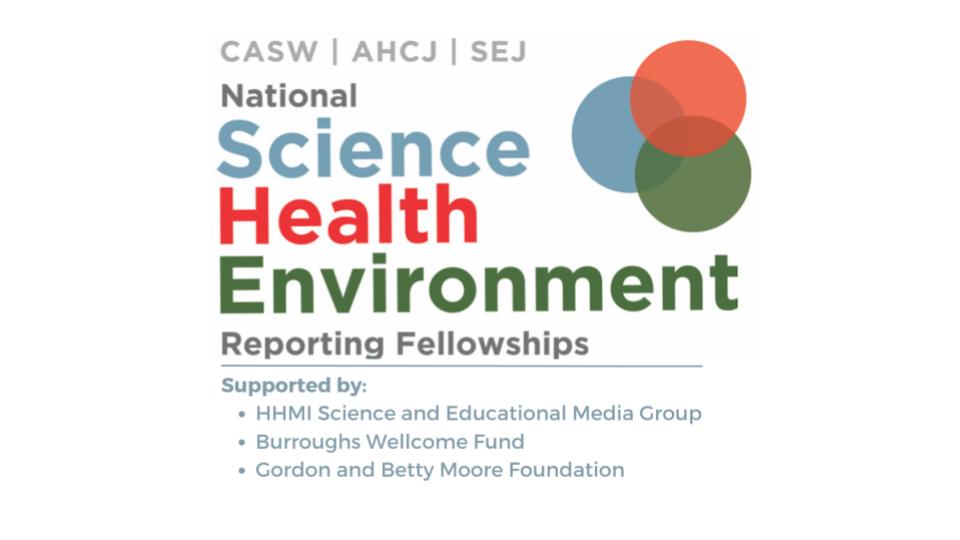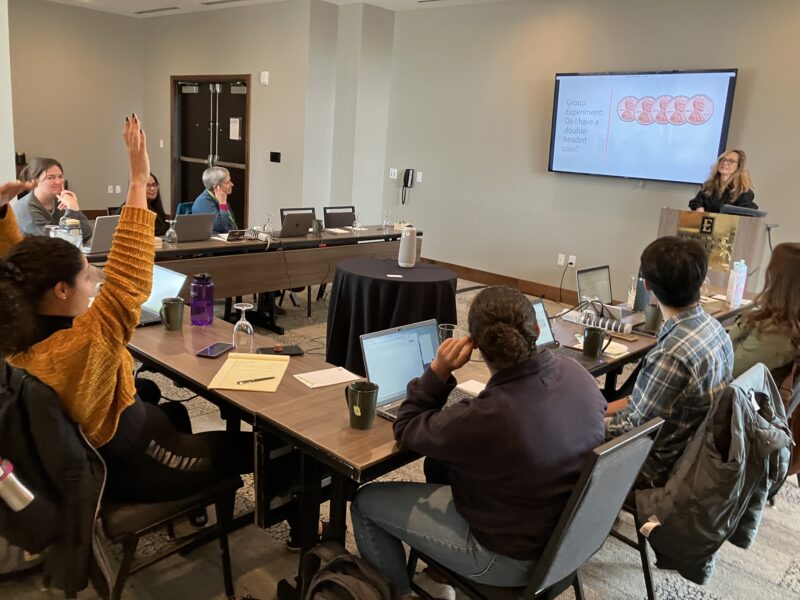
Applications accepted for SHERF program for early-career journalists
The 2024 application window has closed.
US-based journalists interested in building careers reporting on science, health and the environment are invited to apply for cross-cutting fellowships designed to provide training, networking, mentoring, new sources and story ideas, while allowing them to continue their paid work.
The National Science-Health-Environment Reporting Fellowships, launched in 2021, are a collaboration of the Association of Health Care Journalists (AHCJ), CASW, and the Society of Environmental Journalists (SEJ). The year-long fellowships are open to early-career journalists interested in covering any or all of the three fields. To date, 25 journalists have completed the SHERF program; program graduates today are working at media outlets from Seattle to South Texas, from Southern California to Boston, covering topics from climate impacts to homelessness and health.
In today’s volatile media industry, it is harder than ever to build a sustainable career as a specialized journalist. Through expert training, peer mentoring, and networking, this unique program seeks to enable journalists to report rigorously on complex topics, issues, and policies, and to pursue a wide variety of stories, sources, and career opportunities. The project also aims to increase equity and diversity on these beats, where journalists of color have long been underrepresented. The fellowships offer a practical and effective opportunity for those who face barriers to accessing the traditional steps on the journalism career ladder, such as the cost or time commitment required for academic training in specialized journalism.
“The SHERF fellowship gives early-career journalists the necessary support to take a deep dive into beat reporting, and really hone their skills,” said Luke Runyon, SEJ’s board president. “It’s important for science, environment and health journalists to feel like they’re part of a community. I’m excited we were able to secure the funding needed to welcome a new cohort of fellows who will be able to grow their networks and take advantage of this great opportunity.”
“The Council for the Advancement of Science Writing is proud to collaborate for a third year in offering this crucial training for working journalists,” said Robin Lloyd, CASW board president. “Many of us know how daunting the steep learning curve can feel when reporting science, health and environment stories. This fellowship is effective in giving journalists a stronger footing as they dive into technical material, thereby boosting their confidence, the quality and impact of their work, and their service to readers.”
“The Association of Health Care Journalists is thrilled to support early career journalists through SHERF,” said Felice Freyer, AHCJ board president. “We encourage people to apply for this career-changing opportunity, which gives you not only cutting-edge training, but also a network of fellows and mentors to support you.”

Funded by the HHMI Science and Educational Media Group, the Burroughs Wellcome Fund, and The Gordon and Betty Moore Foundation, the program will provide 12 fellowships starting in March. The program is particularly aimed at staff and freelance journalists with between two and 10 years of professional reporting experience.
“These fellows are the future of science journalism,” said Catherine Matacic, science editor for HHMI’s Tangled Bank Studios. “Not only do they educate their readers about the wonders—and dangers—of new technologies, but they provide irreplaceable services to their communities, delivering vital health information, sifting through competing research claims, and launching investigations when the clean water, air, and soil of their neighbors is under threat. We are very proud to continue to support them.”
“Supporting the SHERF fellowship isn’t just an investment in journalism; it’s a commitment to nurturing diverse voices in science, environment, and health reporting,” said Russ Campbell, director of science communication at the Burroughs Wellcome Fund. “The training, mentoring, and network-building these fellows experience during the SHERF year will help ensure that a multitude of perspectives, backgrounds, and experiences contribute to journalism.”
“These fellowships will nurture the next generation of journalists in science, health, and environmental conservation,” said Holly Potter, chief communications officer for the The Gordon and Betty Moore Foundation. “The interdependence of these fields is becoming increasingly clear. This cross-disciplinary training will enable these journalists to improve public understanding of some of the most critical issues of our time.”
Over the course of a year, selected fellows will:
- Participate in workshops and other events held at the annual conferences for all three host partners: Environmental Journalism (April 3-7 in Philadelphia), Health Journalism (June 6-10 in New York City) and ScienceWriters (early November, location to be announced).
- Learn from custom webinars scheduled throughout the year for additional opportunities to gain skills, connections and resources to inform their reporting.
- Be matched with a professional mentor.
- Receive prepaid memberships in the National Association of Science Writers, SEJ and AHCJ.
- Participate in peer-to-peer networking platforms.
- Receive project support stipends if they are an independent journalist.
Interested? Have questions? We held an informational session with two former SHERFs on February 7. Watch the recording here.
Deadline to apply: Feb. 23, 2024, at 6 p.m. ET, 5 p.m. CT, 3 p.m. PT.
Questions? Contact Andrea Waner at andrea@healthjournalism.org.